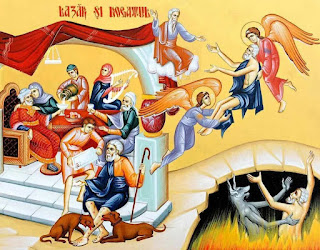Twenty Second Sunday after Pentecost
Gal 6:11-18
Lk 16:19-31
I said it a few weeks ago, and I’ll say it again. Sometimes life can really stink.
Lazarus is a prime example. Poor, sick, and hungry. Poor, sick, hungry - and neglected. It seems that the only comfort he got was when dogs would come and lick his sores. We can presume, however, that he didn’t let it crush him; he maintained what little faith he might have had. Why can we say that? Because, when he died, angels carried him straight to paradise. Jesus said, “pick up your cross and follow me”? The cross Lazarus had to bear was to suffer and be neglected.
Contrast that with the rich man. He dressed in fancy clothes. He ate rich foods every day. Doubtless, he had everything he wanted. But, he ignored Lazarus. He couldn’t plead ignorance. Lazarus lay at his door; the rich man had to pass by him whenever he left his house. And he wouldn’t even give him the scraps from his table.
And then he died and was buried. Remember what we sing at the end of a Panikhida? Everlasting Memory. This rich man is not remembered, except for what he didn’t do.
From hell, he looked up, and he begged Abraham to have mercy on him. But Abraham wasn’t able to give him the mercy. “Blessed are the merciful, for they shall obtain mercy”. The dark side of that might be said to be, “Woe to you merciless, for you shall not obtain mercy”, or, as Jesus said, “Woe to you who are rich, for you have already received your comfort”. In fact, Chrysostom tells us that it was not because of his riches that this man was tormented, but because of his lack of mercy.
You see, riches are not themselves evil, but the rich will often let their wealth become their god. As Paul says, “the love of money is the root of all evil”. Yes, Jesus tells us that it is easier for a camel to fit through the eye of the needle than for a rich man to enter heaven. But then he tells us that with God, all things are possible.
We have a responsibility to those less fortunate than us. Matthew records our Lord laying it out pretty clearly: “When the Son of man comes in his glory, and all the angels with him, then he will sit on his glorious throne. Before him will be gathered all the nations, and he will separate them one from another as a shepherd separates the sheep from the goats, and he will place the sheep at his right hand, but the goats at the left. Then the King will say to those at his right hand, ‘Come, O blessed of my Father, inherit the kingdom prepared for you from the foundation of the world; for I was hungry and you gave me food, I was thirsty and you gave me drink, I was a stranger and you welcomed me, I was naked and you clothed me, I was sick and you visited me, I was in prison and you came to me.’ Then the righteous will answer him, ‘Lord, when did we see you hungry and feed you, or thirsty and give you drink? And when did we see you a stranger and welcome you, or naked and clothe you? And when did we see you sick or in prison and visit you?’ And the King will answer them, ‘Truly, I say to you, as you did it to one of the least of these my brethren, you did it to me.’”
Feed the hungry, give water to the thirsty, cloth the naked, shelter the homeless,visit the sick, visit the imprisoned - do you recognize these? They are six of the seven Corporal Works of Mercy! The only one He doesn’t mention is burying the dead.
My brothers and sisters, Paul tells us that God is rich in mercy. As imitators of Him, we are called to be merciful. Not only with the Corporal Works of Mercy, but with the Spiritual Works of Mercy. They are a summation of what our behavior should be.
The Spiritual Works, again, are: admonish the sinner, teach the ignorant, counsel the doubtful, comfort the sorrowful, bear wrongs patiently, forgive all injuries, and pray for the living and the dead.
Just as our hearts and minds should reflect the Beatitudes, so our actions should always reflect God’s mercy.

Comments
Post a Comment